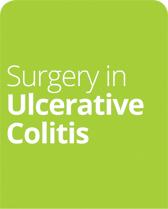Surgery in Ulcerative Colitis
Ulcerative colitis (UC) differs from Crohn’s disease (CD) in that it can be cured by surgery. When sections of the bowel are removed in CD there is a 90% chance of recurrence and a 50% chance that further surgery will be necessary. As UC only affects the large bowel, removing the large intestine will result in complete cure of the condition.
Such surgery, does of course involve removal of the whole large intestine. Many years of experience have shown that trying to take out pieces of large intestine (e.g. the descending and sigmoid colon in a case of left-sided colitis) is not effective treatment – the remaining colon virtually always becomes affected by Inflammation and the problem recurs.
Surgery is indicated for a number of reasons in UC. Often it is simply a failure to respond satisfactorily to medical treatment, or because of repeated side-effects caused by drugs such as prednisolone and azathioprine. Surgery is always needed in cases of fulminant colitis leading to toxic dilatation of the colon, and when cancer develops. It may also be recommended when colonoscopic screening reveals pre-malignant changes such as dysplasia or the presence of a dysplasia-associated lesion or mass (DALM).
At one time such surgery meant that an artificial opening for the small intestine, or stoma, needed to be formed. A spout of ileum was left protruding from the abdominal wall and a bag was necessary into which the small bowel contents could discharge. As the contents of the small bowel were liquid, and there was no muscle to control its rate of flow, such bags have to be changed regularly. Nevertheless many patients found ileostomy to allow a vast improvement in their health. It gave them back control of their lives, and enabled them to live happily without fear of further setbacks.
Nevertheless, an ileostomy was unpopular with many and there is nowadays an alternative, known as an ileo-anal anastomosis. This was first developed by Sir Alan Parkes at St Mark’s Hospital, and later by W G Everett at Addenbrooke’s Hospital. When the large bowel is removed, care is taken not to damage the muscles and nerves controlling the anus. A pouch is then constructed from loops of small bowel. When the pouch has healed, it is connected to the anus in such a way that the anal muscles can still control its emptying, so that no external bag is necessary.
As the contents of the pouch are fluids entering from the small bowel, and as there is no large bowel left to dry out the stool, the pouch usually needs to be emptied 3 or 4 times daily and the faeces is soft or liquid. Nevertheless this enables patients to get rid of their colitis and regain satisfactory control of their bowel function.
As CD may affect the small bowel as well as the large, it is not customary to perform ileo-anal pouches in patients with CD. Active CD in a pouch would be very difficult to manage.. Even in patients with UC, changes in the bacteria living in a pouch may lead to inflammation, causing frequent stools, and abdominal pain. This is referred to as ‘pouchitis’. It will respond to antibiotics, and persistent cases sometimes benefit from a trial of the LOFFLEX diet. Severe and refractory cases may necessitate removal of the pouch and the construction of a traditional ileostomy.
Resection of part of the large intestine in either CD or UC does not usually require a special diet. After the operation, the diet will be built up gradually from liquids to a light diet and then back to a normal diet. If the whole of the large intestine has been removed, an ileostomy or pouch will be formed. The small intestine needs some time to adapt to some of the functions of the large intestine and at first plenty of fluids and salt are required. It is advisable not to take too much fibre initially to reduce output from the stoma, but this can be gradually increased to suit the individual. Absorption of nutrients is usually normal, (unless, in the case of CD, some of the terminal ileum has also been removed) and therefore patients should keep to a normal varied diet. Patients with ileostomies may prefer to avoid foods which cause unacceptable smells such as onions, lentils, pulses and sprouts.

